【インタビュー】清水浩司の太鼓判「旅で変わらなかった私が、旅で見つけた価値によってやるべきことを見つけた」
広島在住で、小説執筆、フリーライター、編集者など、様々な活動をされている清水浩司さん。50歳という節目で、広島に戻ってきて10年を迎えた時に、これまでの生き方を振り返って少し立ち止まってみるべきでないかと思い始めた。そして、51歳となった2023年4月にスペインへの巡礼の旅に出かけることを決意する。なぜ旅にでたのか、そこに何があったのか、これからどうしていくのか、お話を伺った。
旅に出ることに決めた
これまで東京で本を作る仕事、小説執筆や編集、フリーライターをやっていたんですね。そして2011年に広島に帰ってきたんです。そこからも色々とお仕事を頂けて、ラジオに出たりテレビに出させてもらったり、本を書いたりしていました。そして気がついてみると10年経っていたんです。と同時に50歳になった自分に驚いたんですよ。ひたすらガムシャラに生きてきただけの自分が、もう半世紀も生きてしまっている。「あと10年経ったら還暦だって!?」って。
この歳になると、周りの環境も大きく変わっていきます、そして自分の周りにも亡くなってしまう人もいたりする。ここらで一度立ち止まるべきなんじゃないかという気持ちが大きくなってきました。これまでの自分の生き方を振り返ってもう一度どちらを向いて生きていくのか考えたいと思ってしまったんです。
この歳になると、周りの環境も大きく変わっていきます、そして自分の周りにも亡くなってしまう人もいたりする。ここらで一度立ち止まるべきなんじゃないかという気持ちが大きくなってきました。これまでの自分の生き方を振り返ってもう一度どちらを向いて生きていくのか考えたいと思ってしまったんです。
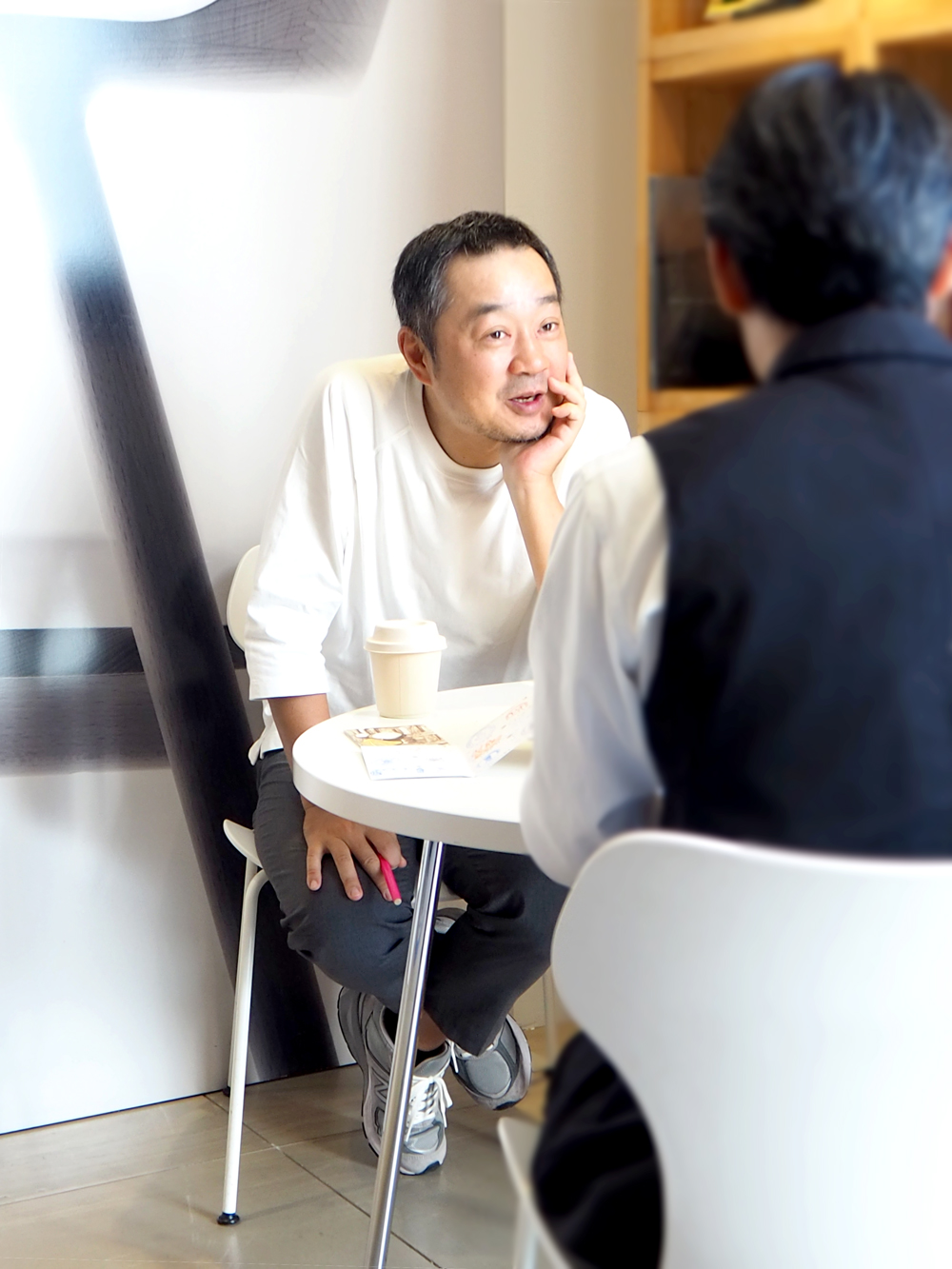
流石に50を超えると残りの人生のことも考えてしまいます。時間的にも体力的にもできることは限られてくる。極端なことを言えば、明日死んでしまうかもしれないし、認知症になることだってあり得る。じゃあ、自分はあと人生で何がしたいんだって考えてみたんですよ。その時出てきたのが、海外をふらふらしたい、ということでした。実は学生の時にも少しバックパッカーのようなことはしていたんですが、もう一度見知らぬ土地に立って全身で自由を感じたいと。今はまだギリギリ動ける自分でいるんですよね。ただもう目の前に迫っているのは、親の介護や子供の受験や収入のことや、自由に動けなくなる理由です。さらにちょうどというべきか、レギュラーで出演していたラジオ番組が終了したり、義理の母親が亡くなったりなどの出来事もあり、これは行けってことなのかなと。それで、勢いで巡礼の旅に出ると言ってしまったんです。
言ったはいいけどーーー
それがですね、勢いもあって巡礼の旅に行くぞと言ってしまったところまでは良かったのですが、それを言った後の後悔はものすごかったですね。それからは行きたくない、行きたくないと会うひとごとに言っていましたから。そんな時に、脚本家の渡辺あやさんに会った時に「あんなこと言ったけど旅に行きたくないんですよ。だって、今やっている仕事も止めないといけないし、今後の仕事もあるのかもわからない。今まで自分は順調とはいい難いけどコツコツとやってきた、そのレールから外れることになるのがちょっと怖いんです」というようなことを言ったんです。そしたらあやさんに言われた言葉でハッとしました。「清水さん、あなたレールに乗っているつもりでいたんですか!?」って。確かに私は今まで会社勤めもほとんどしたことがなくて、フリーでずっと働いてきて、そもそも世間一般の人が言うレールには乗っていなかったんだ、ということに気がついてなくすのが怖いと思っていたけど、そもそも何も持ってなかったし、レールに乗ってたつもりだったけど、実はそこはただの野っ原だったんです(笑)。ひとりで電車ごっこをしてただけ。だったら旅に行っても同じじゃない?――って。
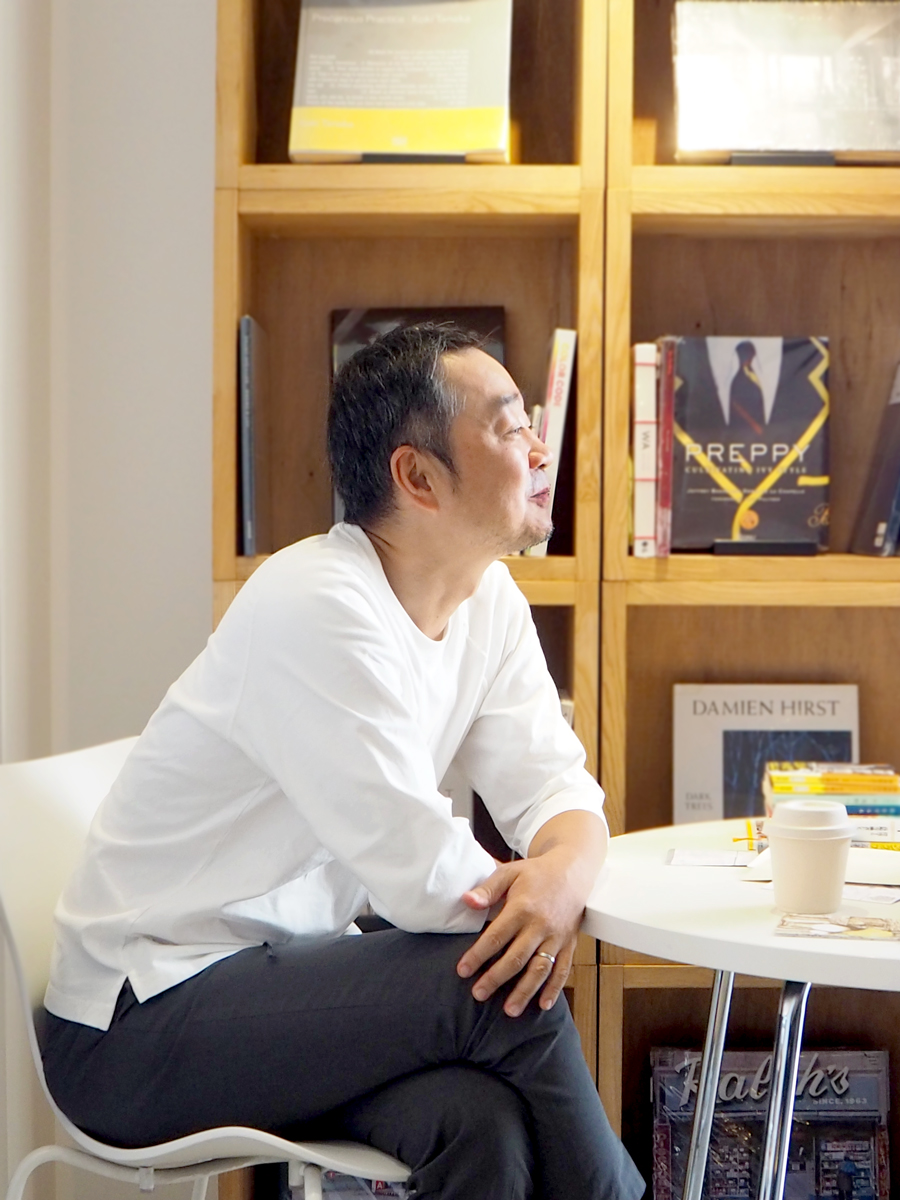
なぜスペインへの巡礼だったのかというと、それはたまたまドキュメンタリーでサンティアゴ巡礼を見て、そこからです。ただ、巡礼の旅というのは取っ掛かりで、だいたい巡礼の旅って1ヶ月ぐらいでゴールできるということは調べていたんです。ただ旅の期間は3ヶ月で考えていて、それはちょっと多めにサバを読んだのと、ゴールした後はなんとなくその続きを歩いてみたくて、そして人生で一度ぐらいアフリカに行ってみたいと思っていたというのがあります。ずっと南下すればモロッコに行けますから。
旅立ってみて
旅ってその人の性格や人となりが全部表れるんですよね。私の場合は行くって決めたのになかなか出発できなかったり、でもスタートしてしまえばスムーズなんです。そういう自分の特性というか自分を再確認できたということはありました。巡礼の旅自体は先程も行ったようにトラブルも少なくスムーズでした。というのも巡礼地を歩く人たちは生きることに真剣で純粋な人たちが多いんですよね。宿が取れなくて共同で一部屋取って、というようなこともありました。そしてたいてい夕食など皆で食べるんですよ。私はスペイン語などほとんど喋れない状態だったのですが、それぞれの出身地の言葉で知っている言葉を言い合うだけでも結構盛り上がるんですよ。それは楽しい経験でしたね。
巡礼をしている人は、敬虔なクリスチャンばかりかと思ったらそうでもなく、純粋に旅を楽しんでいる若い人なども多かったですよ。話を聞いてみると30歳ぐらいの韓国の人はTRUTH(真実)を探しに来たと言っていました。
巡礼をしている人は、敬虔なクリスチャンばかりかと思ったらそうでもなく、純粋に旅を楽しんでいる若い人なども多かったですよ。話を聞いてみると30歳ぐらいの韓国の人はTRUTH(真実)を探しに来たと言っていました。
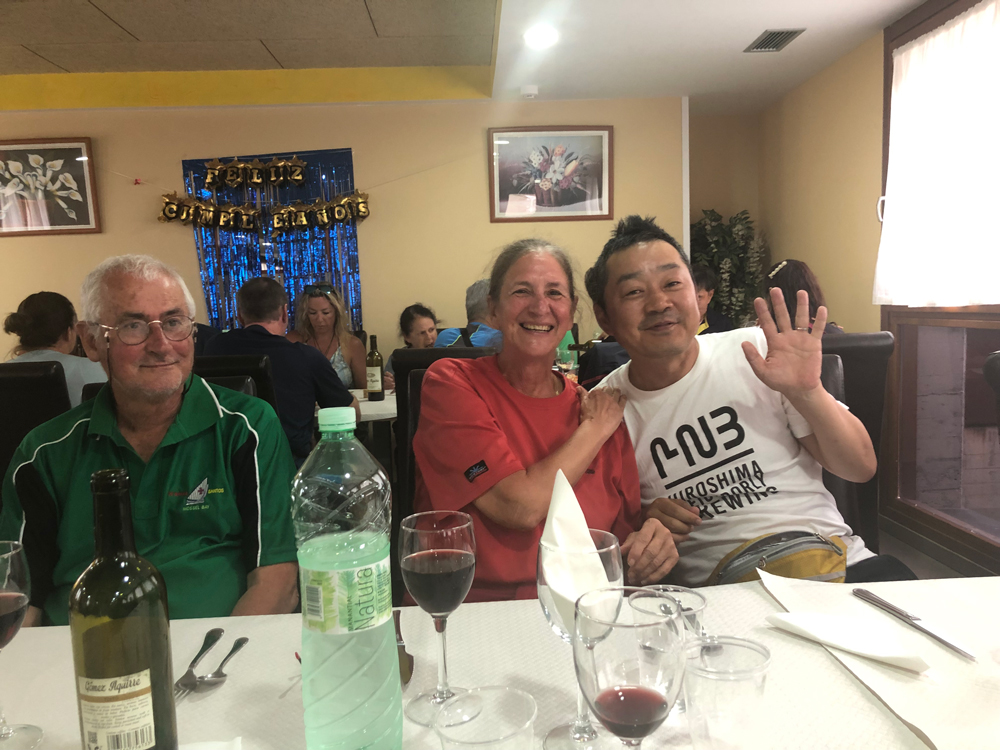
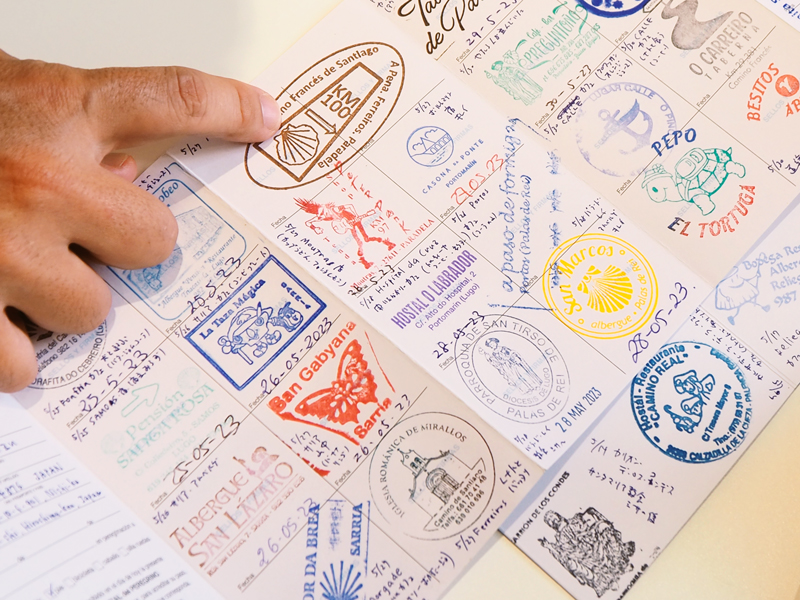
旅の中で感じたかけがえのない価値とそこで得たもの
本を作ることや文章を書くことを仕事としている私が言うのもあれなんですが、フィクションから得るものとはまた違った、リアルの楽しさというものを再確認できました。実際に見る、感じる、食べる、人と出会う、そこから感じるリアルが本当に胸を打ちました。また、ちょうど旅をしていた4月〜5月というのは、気候も良かったんですね。これから巡礼の旅にでようという方にはぜひこの季節をお勧めしたいです。新緑の美しさ、自然の美しさを満喫できました。
旅の間は生活スタイルも大きく変わりました。人間の本当に余計なものがないシンプルな生活とでもいいましょうか。朝起きて、歩いて、お腹が空いたらご飯を食べて、暗くなったら歩くのを止めて、宿で寝る。それでも最初は、これからのこと、仕事のことなどぼんやりと考えながら歩いていました。ですが、途中からそんな先のことはどうでもよくなって、今のこの瞬間、そしてこの後なにをするか、明日どっちに行くか、という眼の前の旅、目の前の今をひたすら生きる、そして旅そのものだけを楽しむという境地に至りましたね。それはとても心地よい瞬間でした。
旅の間は生活スタイルも大きく変わりました。人間の本当に余計なものがないシンプルな生活とでもいいましょうか。朝起きて、歩いて、お腹が空いたらご飯を食べて、暗くなったら歩くのを止めて、宿で寝る。それでも最初は、これからのこと、仕事のことなどぼんやりと考えながら歩いていました。ですが、途中からそんな先のことはどうでもよくなって、今のこの瞬間、そしてこの後なにをするか、明日どっちに行くか、という眼の前の旅、目の前の今をひたすら生きる、そして旅そのものだけを楽しむという境地に至りましたね。それはとても心地よい瞬間でした。
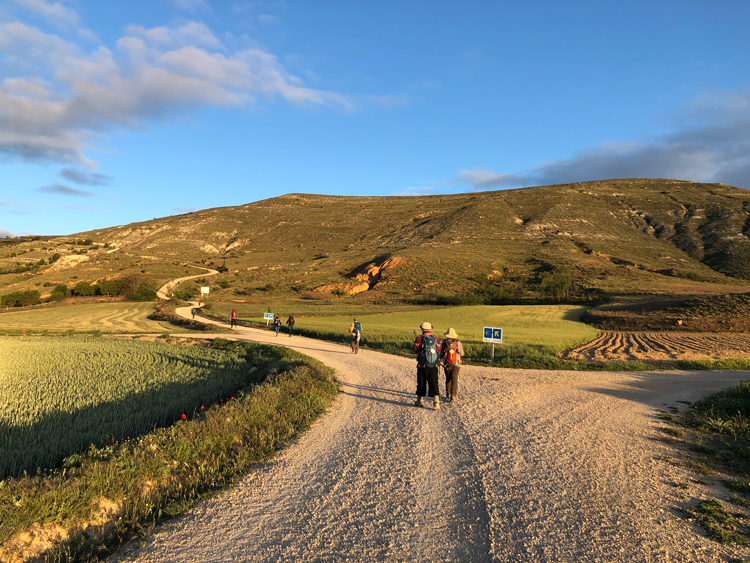
最初の方でも話したように、私自身は若いときにもバックパッカーのような旅をしているんです。ただ、今回の旅と若い頃の旅の間には明確な違いを感じています。
私はこのインタビューの中で、実は皆さんを旅に誘いたいと思っているのですが、歳をとってからの旅というのをお勧めしたいのです。それもできれば50歳ぐらいで。
若いときの旅というのは、今思い出そうとしてもあまり思い出せないんですね。それが何故かというのが今回旅に出てみてわかりました。若い頃ってまだまだ先があるっていうのが意識しなくても常にあるんです。なのでまたここに来ることができるという思いが無意識の中にある。今回の旅に関しては、もう最後かもしれないという思いが強く、旅で目にする全ての光景がドラマチックに目に映るんです。さらに50にもなると積み重ねてきた人生経験がありますよね。そこで得た知識や人との繋がりの記憶などが旅をより味わい深いものにしてくれるんです。より旅を濃厚に噛みしめることができるとでも言うんでしょうか。
人の一生を一日に例えると50歳は夕方5時ぐらいらしいんですね。5時と言うと夏ならまだ明るいのですが、冬ならもう薄暗い。残り少ない日差しが残っているうちにこの世界を味わい尽くしたいという思いが、旅をよりかけがえのないものにしてくれました。夕焼けやマジックアワーの時間って美しいじゃないですか?昼でもなく、夜でもない。もう若者でもなく、まだ老人でもない。思わず立ちどまってぼんやりしてしまうような、そんな貴重な「あわい(間)の時間」が人生でいうと50歳くらいなのかなって思います。
私はこのインタビューの中で、実は皆さんを旅に誘いたいと思っているのですが、歳をとってからの旅というのをお勧めしたいのです。それもできれば50歳ぐらいで。
若いときの旅というのは、今思い出そうとしてもあまり思い出せないんですね。それが何故かというのが今回旅に出てみてわかりました。若い頃ってまだまだ先があるっていうのが意識しなくても常にあるんです。なのでまたここに来ることができるという思いが無意識の中にある。今回の旅に関しては、もう最後かもしれないという思いが強く、旅で目にする全ての光景がドラマチックに目に映るんです。さらに50にもなると積み重ねてきた人生経験がありますよね。そこで得た知識や人との繋がりの記憶などが旅をより味わい深いものにしてくれるんです。より旅を濃厚に噛みしめることができるとでも言うんでしょうか。
人の一生を一日に例えると50歳は夕方5時ぐらいらしいんですね。5時と言うと夏ならまだ明るいのですが、冬ならもう薄暗い。残り少ない日差しが残っているうちにこの世界を味わい尽くしたいという思いが、旅をよりかけがえのないものにしてくれました。夕焼けやマジックアワーの時間って美しいじゃないですか?昼でもなく、夜でもない。もう若者でもなく、まだ老人でもない。思わず立ちどまってぼんやりしてしまうような、そんな貴重な「あわい(間)の時間」が人生でいうと50歳くらいなのかなって思います。
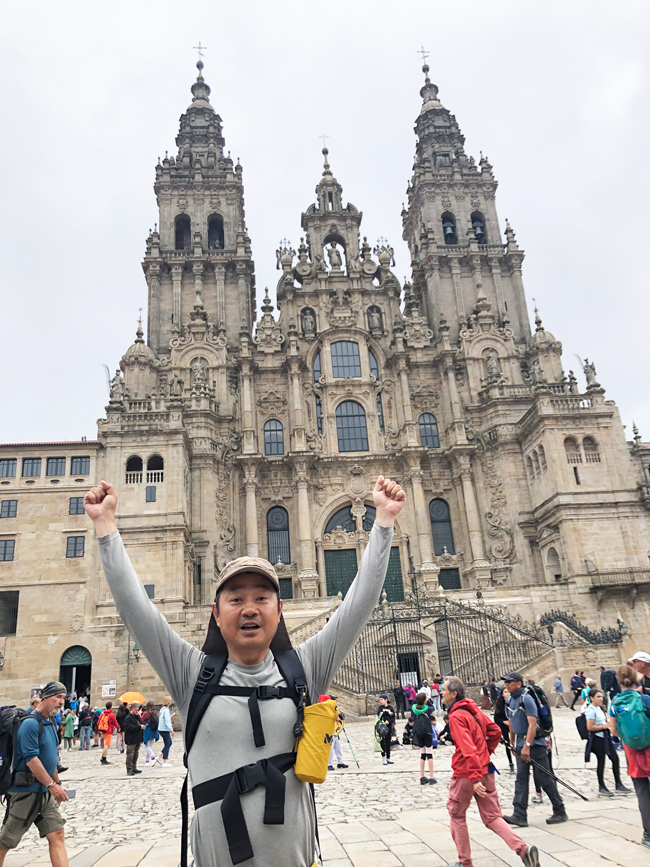
旅を終えて
旅をしている間、健康面でなにかトラブルがあったかというと何もなかったんですよ。スタート時に多少お腹を壊したということはありましたが、慣れというのは恐ろしいもので、その後は全然大丈夫でした。ですが、旅を終えて広島に帰ってきてからは、1ヶ月ぐらい寝込んでしまいました。よっぽど旅の間気を張っていたんだと思います。寝込みながら旅についてゆっくり考える時間もあったのですが、そこで感じたことがあります。まず、自分はお金をあまり必要としていないのかな、ということです。旅のスタート時は荷物も多かったんです。ですが、旅の途中でどんどん必要ないものを捨てていって、身軽になってきました。そして、自分はそんなにお金を使わないし必要としていないなと感じた時にすごく楽になったんです。旅をしている自分は年収とか肩書とか名声とかどうでもよくなった。どうせ天国にはお金持って行けないし。その代わり好きなことをするという自由を手に入れました。とにかく僕にとっては身軽なことが一番で、動きやすい状態でいることが大事なんだと思いました。
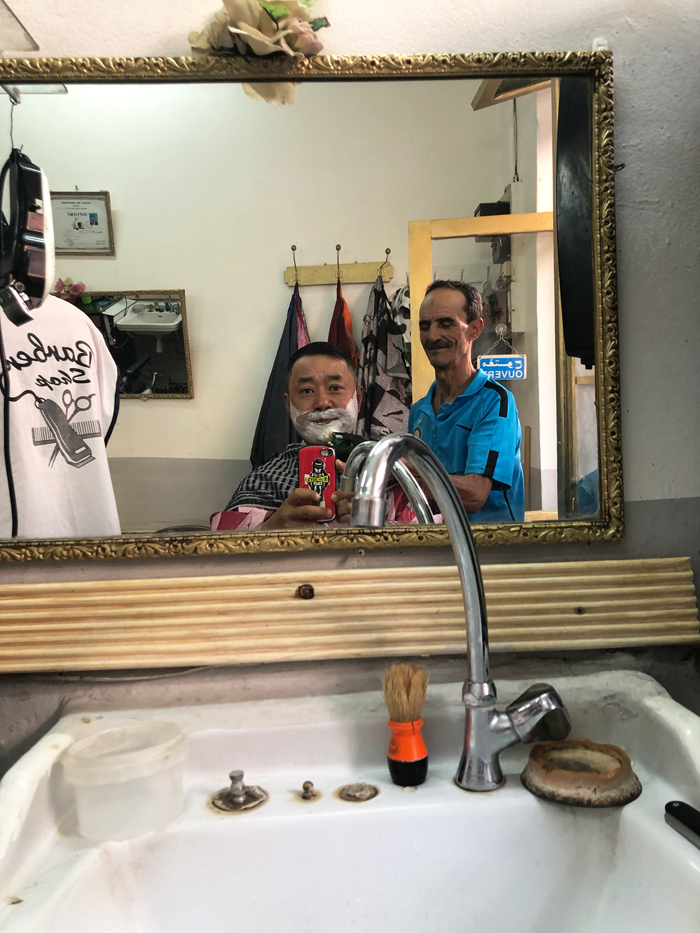
それから現在、このインタビューを受けながらも思っていることですが、私はとにかく皆を旅に誘いたいのです。今回、私がやってみたいと思っていたのは令和版の『深夜特急』(注:沢木耕太の書いた旅ドキュメンタリー)でした。令和のこの時代、おじさんがデジタル機材を持って放浪の旅をするとどうなるのか。そこで感じたのは、今までも言ってきましたが、歳を取ってからの旅は下敷きになる経験があるからこそ旅がより魅力的になるということです。私自身が人間としては古いものになってきているのですが、ヨーロッパなどは建物自体も古いものに価値を見出す文化があります。その古いものの上に何を載せられるのか。考えるきっかけとなりました。だから皆にも「旅に出てみたら?」っていう誘惑をしたい。もっと外に飛び出して、どんどん新たな経験を積み重ねてほしい。もし飛び立つのが怖くてもじもじしている人がいたら、その人の背中をどーん!と押してみたいのです。無責任な感じで(笑)。
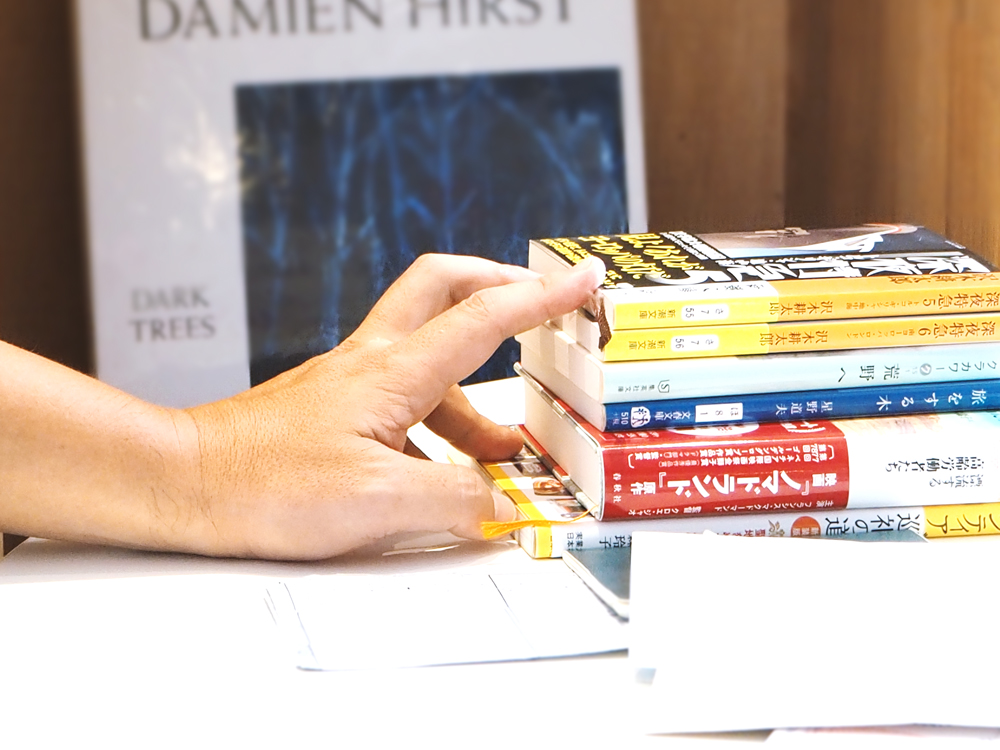
旅を通して見つけた価値、そしてこれから
価値って人それぞれ違うものですよね。私は書く仕事をしているのですが、それは自分が大事にしている価値だと思っています。さらに旅を通して、自分が実感したもの、自分が信じた価値を大切にしたいと思いました。多様な国籍の多様な価値観を持つ人たちと触れ合ったことで、結局私は私が信じた価値の上を歩くしかないと吹っ切れたのです。
旅を終えて数ヶ月が経った今、気持ちのテンションが開けているんです。そこで、旅の途中で書いていたnoteのような旅のスケッチではなく、もう一度巡礼の旅について自分の中で消化したものをもう一度しっかり考えて文章にしたいと思っています。この3〜4年書きたいものがなかったのですが、今は「このことを書きたい」という気持ちが湧いてきています。
旅を終えて数ヶ月が経った今、気持ちのテンションが開けているんです。そこで、旅の途中で書いていたnoteのような旅のスケッチではなく、もう一度巡礼の旅について自分の中で消化したものをもう一度しっかり考えて文章にしたいと思っています。この3〜4年書きたいものがなかったのですが、今は「このことを書きたい」という気持ちが湧いてきています。
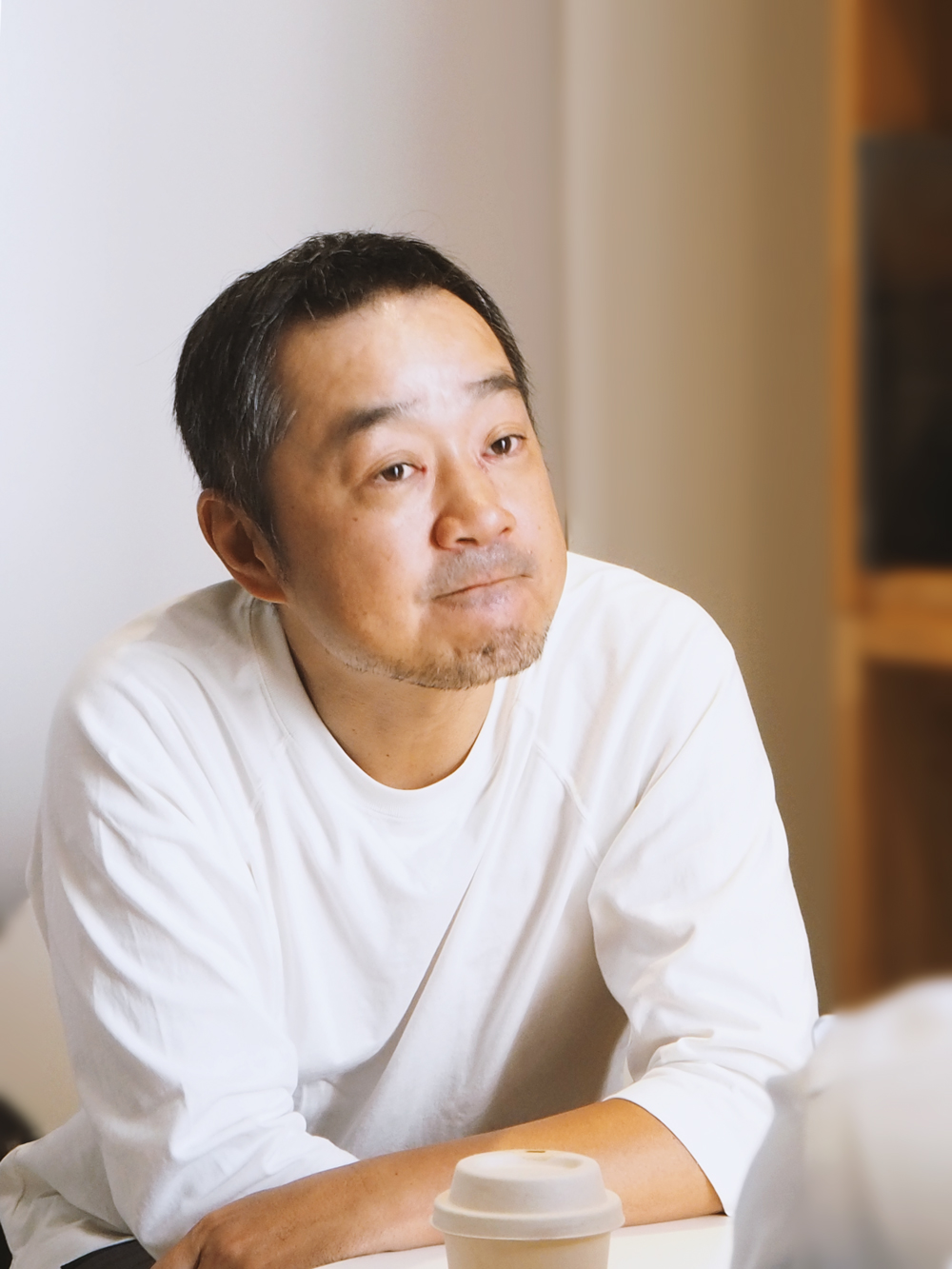
さらに次のこともぼんやりと考えているのですが、私はこの旅で自分が思ったほど変わらなかったなと感じたんです。代わり映えのない自分を見つけたことで、この自分で戦っていかなければならないという覚悟を得ることができました。と同時に、この自分というものをもっと知りたい、という思いにかられています。私は家族、特に両親と向き合うことなく逃げていたんですね。その中で海外への旅に出たことで、グローバルなものではなく、むしろドメスティックなものに答えがあるのではないかと感じました。自分のルーツに向き合っていくという旅、「実家」という国への巡礼の旅を新たに始めるべきではないかと今は思っています。そしてこれもまた行きたくない思いが強いのですが(笑)、この旅にはリミットがあります。いつまでも両親が健在でいるかどうかわからない。そういうところから自分を追い込んでいく必要もあります。誰に何を言われようと、自分が面白いと思うことを追求する。そんな覚悟が生まれたというのも、この旅で得た価値だったのかもしれません。
【プロフィール】
清水浩司(しみずこうじ)
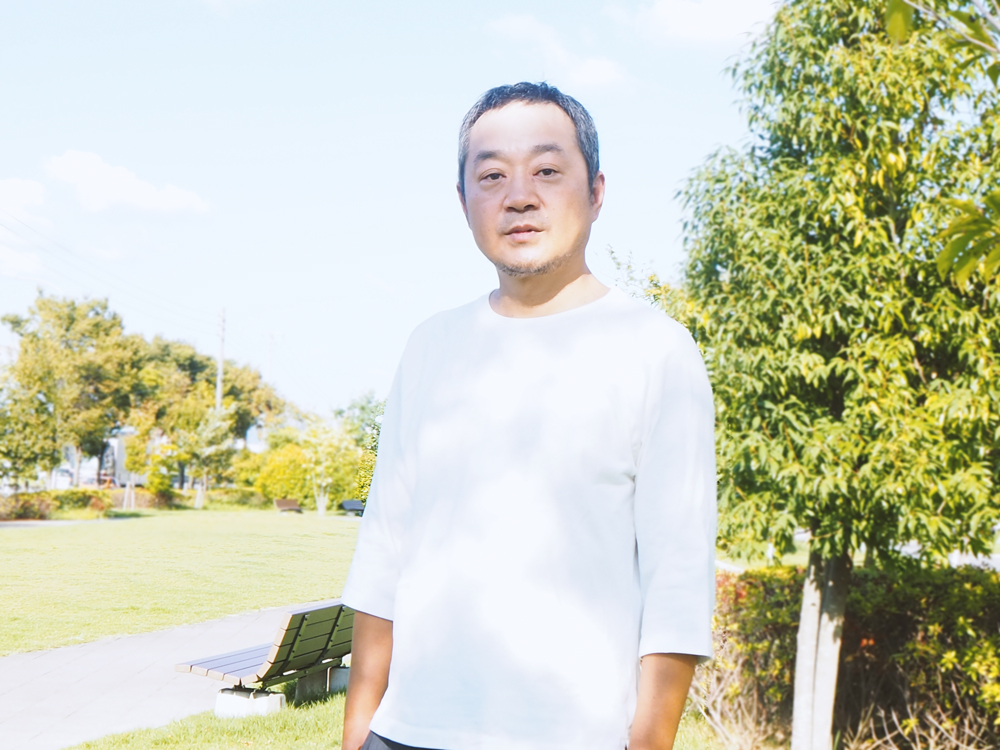
作家 ライター 編集者
1971年12月24日生まれ、広島出身。広島市西区在住。広島学院中学校・高等学校卒業。一橋大学社会学部卒業。雑誌編集者を経てフリーランスのライター/編集者として独立。音楽/映画/文学などを中心に活動する。2011年に川崎フーフ名義で発表した書籍『がんフーフー日記』(小学館)が話題となり、2015年、映画『夫婦フーフー日記』(主演:佐々木蔵之介、永作博美)として公開される。2011年、広島に拠点を移す。現在は取材、執筆、書籍の構成・編集、講演、ラジオのパ ーソナリティ、テレビのコメンテーターなど多岐にわたって活躍中。著書に小説『ぼんちゃん!』『真夜中のヒットスタジオ』(ともに小学館文庫)、共著『文芸レアグルーヴ〜いま ぼくたちが読みたい日本文学の 100冊』(マーブルトロン/中央公論新社)などがある。 2018年、14年ぶりの長編小説『愛と勇気を、分けてくれないか』(小学館)発表。本作で第9回広島本大賞受賞(小説部門)。
1971年12月24日生まれ、広島出身。広島市西区在住。広島学院中学校・高等学校卒業。一橋大学社会学部卒業。雑誌編集者を経てフリーランスのライター/編集者として独立。音楽/映画/文学などを中心に活動する。2011年に川崎フーフ名義で発表した書籍『がんフーフー日記』(小学館)が話題となり、2015年、映画『夫婦フーフー日記』(主演:佐々木蔵之介、永作博美)として公開される。2011年、広島に拠点を移す。現在は取材、執筆、書籍の構成・編集、講演、ラジオのパ ーソナリティ、テレビのコメンテーターなど多岐にわたって活躍中。著書に小説『ぼんちゃん!』『真夜中のヒットスタジオ』(ともに小学館文庫)、共著『文芸レアグルーヴ〜いま ぼくたちが読みたい日本文学の 100冊』(マーブルトロン/中央公論新社)などがある。 2018年、14年ぶりの長編小説『愛と勇気を、分けてくれないか』(小学館)発表。本作で第9回広島本大賞受賞(小説部門)。
最近の仕事
広島を舞台にした小説『愛と勇気を、分けてくれないか』(小学館)発表(2018.6.8) ※秦 基博さん(シンガーソングライター)、西加奈子さん(直木賞作家)、永作博美さん(女優)、湯﨑英彦さん(広島県知事)が帯にコメントを寄稿。佐賀大学医学部付属病院主催・県民公開講座(2015.6.13)、ソニー生命保険株式会社セミナー(2015.10.28〜29)、第68回広島医学会総会(2015.11.8)、広島ホスピスケアをすすめる会主催講演(2017.2.19)、第42回広島県病院学会(2017.3.26)、第19回日本死の臨床研究会中国・四国支部大会(2018.5.13)などで講演を行う。
広島を舞台にした小説『愛と勇気を、分けてくれないか』(小学館)発表(2018.6.8) ※秦 基博さん(シンガーソングライター)、西加奈子さん(直木賞作家)、永作博美さん(女優)、湯﨑英彦さん(広島県知事)が帯にコメントを寄稿。佐賀大学医学部付属病院主催・県民公開講座(2015.6.13)、ソニー生命保険株式会社セミナー(2015.10.28〜29)、第68回広島医学会総会(2015.11.8)、広島ホスピスケアをすすめる会主催講演(2017.2.19)、第42回広島県病院学会(2017.3.26)、第19回日本死の臨床研究会中国・四国支部大会(2018.5.13)などで講演を行う。
編集書籍
野村謙二郎『変わるしかなかった。』(KKベストセラーズ)(2015.2.25)3刷・前田育男『デザインが日本を変える 日本人の美意識を取り戻す』(光文社)(2018.5.30)2刷、松田哲也『2045年、おりづるタワーにのぼる君たちへ』(ザメディアジョン)(2019.6.26)、緒方孝市『赤の継承 カープ三連覇の軌跡』(光文社)(2021.1.20)3刷
野村謙二郎『変わるしかなかった。』(KKベストセラーズ)(2015.2.25)3刷・前田育男『デザインが日本を変える 日本人の美意識を取り戻す』(光文社)(2018.5.30)2刷、松田哲也『2045年、おりづるタワーにのぼる君たちへ』(ザメディアジョン)(2019.6.26)、緒方孝市『赤の継承 カープ三連覇の軌跡』(光文社)(2021.1.20)3刷
レギュラー
雑誌『音楽と人』において音楽コラム&ディスクレビュー執筆(2012.11〜)、RCC テレビ『イマナマ!』毎週月曜日コメンテーターを担当(2019.4〜)、広島FM『ホントーBOYSの文化系クリエイター会議』パーソナリティ(2019.8〜)
雑誌『音楽と人』において音楽コラム&ディスクレビュー執筆(2012.11〜)、RCC テレビ『イマナマ!』毎週月曜日コメンテーターを担当(2019.4〜)、広島FM『ホントーBOYSの文化系クリエイター会議』パーソナリティ(2019.8〜)
構成_広島 蔦屋書店 文学コンシェルジュ 江藤宏樹

